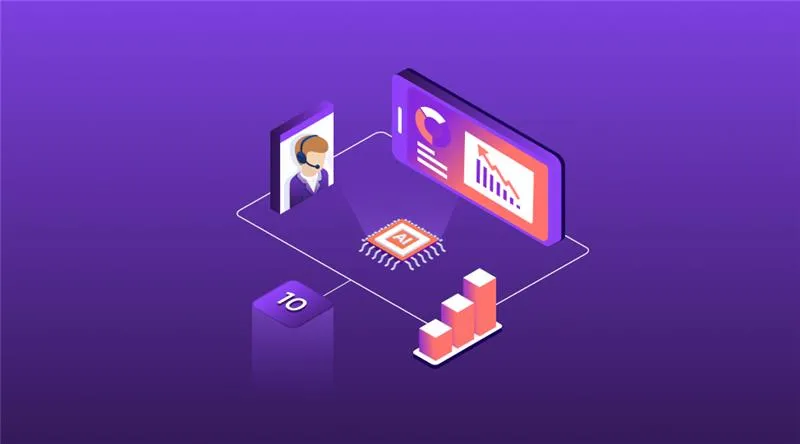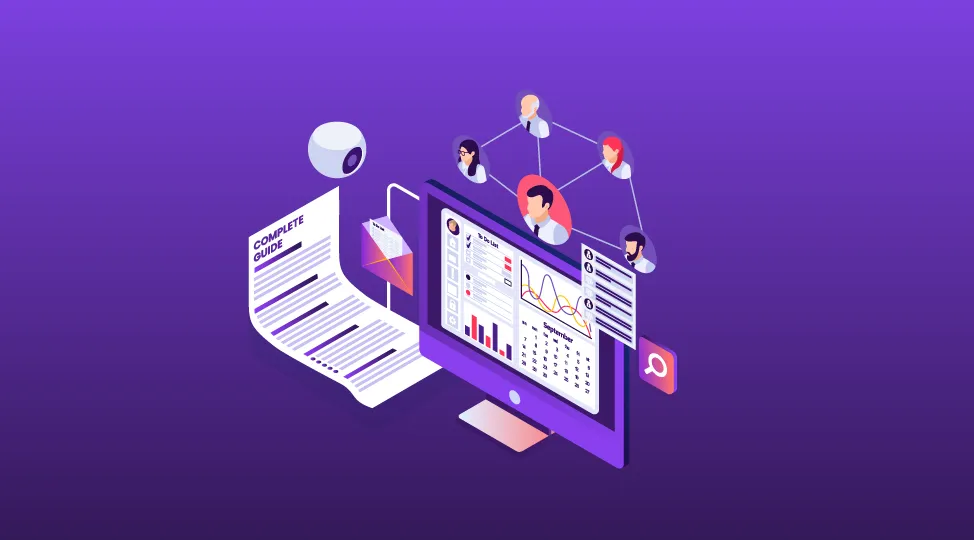What if every repetitive task in your company could run itself? What if your teams stopped drowning in approvals, spreadsheets, and manual processes - and instead focused on strategy, innovation, and growth?
This is where AI automation steps in. In 2026, the conversation has shifted from “should we try it?” to “how fast can we scale it?” McKinsey’s latest global survey shows AI is now mainstream across business functions, and Gartner expects GenAI-enabled capabilities to be deployed widely in production environments by 2026.
If you’re looking for practical AI automation case studies - not hype, this guide breaks down where automation is delivering measurable ROI today. It covers AI automation applications use cases industries across finance, operations, HR, legal, customer support, and healthcare.
What are examples of AI automation in business?
AI automation applies machine learning and rules to streamline work like invoice processing, fraud monitoring, onboarding, contract review, customer support, price optimization, predictive maintenance, content ops, audits, and healthcare scribing—cutting cycle times, errors, and costs while improving compliance and CX.
How AI Automation is Transforming Business Operations
AI Automation in Business is reshaping industries by reducing manual work, improving speed, and cutting costs. Instead of spending human effort on data entry, approvals, or monitoring, intelligent systems now handle them. The result is faster decisions, fewer mistakes, and a clear competitive advantage.
AI automation extend across every domain: finance, HR, marketing, compliance, and healthcare. From predictive analytics to natural language processing, automation frees people to focus on strategic and creative tasks instead of routine chores.
Now that we know the bigger picture, it’s time to explore the most valuable AI automation business use cases that drive measurable results.
Top Benefits of Using AI Automation
The value of AI automation isn’t only “time saved.” It’s the compounding effect of better speed, accuracy, and governance across your workflows - especially when you choose the right intelligent automation use cases.
Key benefits include:
- Faster workflows with reduced manual intervention
- Lower operational costs through smart automation
- Higher accuracy and fewer human errors
- Improved compliance and security monitoring
- Enhanced customer satisfaction with real-time response
- More time for employees to focus on innovation
In short, AI automation creates a smarter balance. Machines take care of the boring repetitive work, while people focus on the meaningful tasks that move a business forward.
Knowing the benefits is only half the story, the next step is knowing how to start AI implementation effectively.
Top 10 AI Automation Business Use Cases
Below are high-ROI, repeatable examples of ai automation in business that most organizations can start with. These automation patterns work best when paired with good data quality, clear ownership, and a human-in-the-loop step for edge cases.
1. Intelligent Invoice Processing & Finance Operations
Finance teams often waste long hours checking invoices, entering numbers into systems, and chasing approvals. Even a small error in a single entry can lead to huge financial loss or compliance issues. With AI automation services, invoices are scanned, verified, and processed in seconds. Approvals move faster, fraud risk is lowered, and the finance staff get more time to focus on strategy rather than paperwork.
Key benefits:
- Faster approvals and smoother cash flow
- Fewer errors and reduced fraud chances
- Finance team spends more time on planning and growth
2. Predictive Maintenance in Manufacturing & Logistics
Every minute of machine downtime can cost millions in lost production. Traditional maintenance either happens too late (after breakdown) or too often (causing wasted cost). AI-powered predictive systems analyze machine data, spot early signs of failure, and alert teams before breakdowns happen. Repairs are done only when needed, reducing waste and improving equipment life.
Key benefits:
- Less downtime and smoother production
- Longer life for expensive machines
- Lower repair costs and improved supply chain flow
3. Employee Onboarding & HR Automation
Onboarding new staff is slow with endless forms, checks, and manual training schedules. AI speeds this up by automatically screening resumes, shortlisting candidates, scheduling interviews, and handling digital paperwork. It also personalizes onboarding journeys, recommending training content based on each employee’s role.
Key benefits:
- Faster hiring cycles
- Tailored training for new employees
- Lower admin workload for HR teams
- Happier, more engaged employees from day one
4. Fraud Detection & Financial Risk Management
Fraud happens in seconds, and human teams cannot monitor thousands of transactions in real time. AI tracks huge volumes of data instantly, spotting unusual activity and sending alerts immediately. It doesn’t just stop fraud, it also strengthens compliance, reducing penalties and improving trust with customers.
Key benefits:
- Real-time fraud alerts and faster response
- Better protection of sensitive customer data
- Reduced financial losses
- Stronger compliance with regulations
5. AI Agents for Customer Support & Intelligent Assistants
Customers today hate waiting on hold. AI agents act as intelligent assistants available 24/7. They can answer basic questions instantly, guide customers through troubleshooting, or pass complex issues to human staff with full context. This cuts waiting time, lowers cost, and improves customer satisfaction.
Key benefits:
- Instant replies with always-on support
- Reduced support costs
- Agents hand over complex cases smoothly
- Happier customers with faster solutions
6. Price Optimization & Dynamic Offers in Sales & Marketing
Pricing is never easy. Set it too high, sales drop. Set it too low, margins vanish. AI studies customer behavior, competitor moves, and market trends to suggest the best pricing strategy. It can even send personalized offers in real time, helping businesses stay agile in fast-changing markets.
Key benefits:
- Higher sales with smarter pricing
- Personalized deals for each customer
- Dynamic campaigns that adapt instantly
- Stronger margins and competitiveness
7. Document Processing & Legal Automation
Legal and compliance teams drown in paperwork - contracts, agreements, policies. Reviewing these manually takes weeks and is prone to error. AI quickly scans documents, extracts key terms, highlights risks, and speeds up reviews. This helps legal teams focus more on strategy and less on repetitive reading.
Key benefits:
- Faster contract and legal reviews
- Lower risk of missing key terms
- Reduced manual costs
- Legal teams free to focus on critical tasks
8. Automated Content Creation & Social Media Workflows
Marketing and content teams struggle to scale production while keeping quality consistent. AI tools now help by drafting blogs, captions, reports, and social posts in minutes. With the addition of generative AI development services, businesses go beyond templates to create custom blogs, product copy, and creative campaigns that truly match brand voice.
Key benefits:
- Faster content publishing at scale
- Consistent tone and brand voice
- Data-driven results for engagement
- Scalable creative workflows
9. AI-Powered Internal Audit & Compliance Monitoring
Auditing financial or operational records is long and resource-heavy. AI systems scan thousands of records in real time, flagging irregularities or compliance gaps instantly. This reduces manual effort and improves audit accuracy, giving management better visibility into risk.
Key benefits:
- Quicker and smarter audits
- Real-time compliance monitoring
- Lower penalties and risks
- Clearer insights for leaders
10. Ambient AI and Virtual Scribes in Healthcare
Doctors spend hours typing medical notes instead of focusing on patients. AI scribes now listen to doctor-patient conversations, summarize them, and auto-fill patient records. This saves time, reduces burnout, and improves care delivery.
Key benefits:
- Less paperwork for doctors
- More quality time with patients
- Lower errors in medical records
- Happier staff and patients
Now, let’s take a look at some real-world examples of AI automation.
Top 10 AI Automation Real-World Examples
Next, let’s make this concrete with AI automation examples in real life - organized to mirror the use cases above. These examples also map well to AI automation applications use cases industries where data is structured and workflows are repeatable.
1. Intelligent Invoice Processing & Finance
Companies like SAP and Oracle use AI to scan and approve invoices in minutes, cutting approval time by nearly 70%. Finance teams avoid endless emails and errors, while vendors get paid faster.
2. Predictive Maintenance in Manufacturing
GE and Siemens collect sensor data to predict when machines will fail. This reduces downtime, cuts repair costs, and extends machine life, saving millions for factories and logistics firms.
3. Employee Onboarding & HR Automation
Workday automates resume screening, interview scheduling, and onboarding. HR teams save days of work, and new hires enjoy smoother experiences without long delays.
4. Fraud Detection & Risk Management
PayPal relies on AI to monitor millions of transactions in real time. Suspicious activity gets flagged instantly, reducing fraud losses and building trust with customers and regulators.
5. AI Agents for Customer Support
Bank of America’s chatbot Erica answers banking queries anytime. It provides quick, accurate help, lowers call center costs, and improves customer satisfaction.
6. Price Optimization & Dynamic Offers
Amazon changes product prices daily using AI. By analyzing demand and competition, it drives better margins, faster conversions, and stronger customer loyalty.
7. Document Processing & Legal Automation
LawGeex uses AI to review contracts 80% faster than humans. Businesses cut legal costs, speed up approvals, and reduce risks with automated clause detection.
8. Automated Content Creation & Social Media
HubSpot integrates AI to draft blogs, schedule posts, and give insights on campaigns. Teams create content faster while keeping brand voice consistent.
9. AI-Powered Internal Audit & Compliance
Deloitte automates audits by scanning every transaction instead of random samples. This means faster audits, stronger compliance, and lower costs for companies.
10. Virtual Scribes in Healthcare
Nuance Dragon Medical records doctor-patient talks automatically. Doctors save hours on paperwork, patients get better focus, and medical staff face less burnout.
These AI automation examples in real life show a clear pattern: the highest impact comes from automating end-to-end workflows, not isolated tasks.

How To Implement AI In Business Operations
Implementing AI is less about “adding a tool” and more about embedding automation into how work flows. If you want sustainable ai-powered business automation, follow a practical sequence:
- Audit current processes – Map your workflows. Find areas that waste most time, cost, or create errors. Finance, HR, and customer support are common starting points.
- Define clear goals – Before you bring in AI automation, decide what success means. It could be fewer invoice errors, faster employee onboarding, or quicker customer replies.
- Run small pilots – Begin with one or two workflows. For example, testing invoice data extraction or resume screening. This helps you see real results without heavy risk.
- Select right tools – Choose AI automation services that can scale with your company and also connect with systems you already use.
- Build governance – Set rules for data privacy, compliance, and model updates.
- Train your teams – Make sure employees understand how AI helps them, not replaces them.
Even with the best plan, AI automation services can face roadblocks, so let’s look at common pitfalls and how to avoid them.
Implementation Pitfalls and Mitigation Strategies
Rolling out AI automation sounds exciting, but many companies hit roadblocks when they try to scale. The truth is, even the best AI automation use cases can fail if the foundation is weak. Below are common pitfalls and how you can avoid them:
Data silos
Most businesses keep data scattered in different tools and departments. AI systems cannot learn or give accurate outputs if they don’t access the full picture.
- Break silos early with integrated data platforms.
- Use APIs and data lakes to connect HR, finance, sales, and customer data.
- Make sure data is clean, consistent, and updated in real time.
Over-complex systems
Some firms try to automate everything at once, which creates chaos.
- Start lean with one or two automation pilots in areas like invoice processing or onboarding.
- Scale gradually after proving success.
- Keep workflows simple and easy to maintain.
Security risks
AI models touch sensitive company and customer data. Without controls, you risk breaches.
- Embed continuous monitoring and compliance checks.
- Encrypt sensitive data during storage and transfer.
- Set role-based access to avoid misuse.
Avoid rushing. AI adoption works best step by step, with strong oversight and regular feedback loops from both tech teams and business leaders.
Once challenges are managed, the focus should turn to measuring ROI and tracking business outcomes from these AI automation use cases.
Measuring ROI and Business Impact of AI Automation
Measuring ROI in AI automation use cases is not only about cost, it’s about overall efficiency and long-term value. Businesses need to track numbers, but also look at quality improvements across workflows.
Some of the core metrics include:
- Cost savings – compare labor hours before and after automation. For example, invoice approvals that took 5 hours can now be done in minutes.
- Process speed – measure cycle times for tasks like onboarding, claims approval, or report generation. Faster workflows mean higher throughput.
- Error reduction – track data accuracy in finance, HR, or compliance. Automated systems remove manual mistakes and improve audit readiness.
- Scalability – monitor how well systems handle higher transaction volumes without adding new staff or infrastructure.
- User adoption – measure how often employees or customers actually use the AI automation tools in daily tasks.
- Business outcomes – connect automation results to revenue lift, customer retention, or reduced fraud loss.
Future Trends: What’s Next in AI Automation (2026)
- Rise of agentic AI applications that act autonomously.
- Personalized AI agents that adapt to each employee or customer.
- Auto-generated workflows without human setup.
- Self-healing pipelines that fix errors instantly.
- Expansion of AI chatbot systems beyond customer support into HR and IT.
The landscape is moving toward AI agents that don’t just automate but also reason, predict, and make decisions in real time.
How to Maximize Value with AI Automation
AI automation isn’t a far-away idea anymore - it’s already changing daily operations. The winners in 2026 will be the teams that operationalize AI responsibly, pick the right intelligent automation use cases, and scale them across functions.
The firms that will grow faster are the ones who stop only testing pilots and start putting AI inside daily workflows. Leaders should explore AI development services and make sure every step connects back to business goals.
If you want to save costs, scale quicker, and get more efficiency, now is the right time. Quokka Labs can help plan and build AI automation solutions that fit your goals and deliver real ROI.
Ready to see AI automation examples in real life in your own organization? Talk to Quokka Labs about building AI automation applications use cases industries that fit your stack, your compliance needs, and your ROI targets.

FAQs
1. What Are Real World Examples of Custom AI in Business?
Custom AI often shows up as domain-tuned models and agents: an invoice “copilot” that learns your vendor formats, a support agent trained on your knowledge base and policies, a contract reviewer aligned to your clause library, or a demand-forecasting model tuned to your seasonality. These are examples of ai automation in business where the AI is built around your data and process rules - not a generic chatbot.
2. Which AI Technology Is Best Suited for Automating Backend Tasks Like Invoice Processing?
A strong invoice automation stack usually combines
(1) OCR/document AI or computer vision for extraction,
(2) LLMs or NLP for handling varied formats and validation,
(3) rules/workflow engines for routing and approvals, and
(4) anomaly detection models for fraud and duplicate checks.
This combination is a proven automation stack for back-office finance.
3. What Are Examples of High Impact Ai Workflow Use Cases?
High-impact workflows are high-volume, repetitive, and exception-driven: invoice-to-pay, claims processing, customer support triage, onboarding + access provisioning, KYC/AML checks, contract review and obligation tracking, continuous audit, predictive maintenance scheduling, and clinical documentation. These map directly to cross-industry automation workflows with strong data trails and measurable outcomes.
4. How do you choose the best AI automation use cases for your industry in 2026?
Start by prioritizing workflows that are high-volume, repetitive, and measurable - like invoice processing, customer support triage, onboarding, compliance checks, and document review. In 2026, the best results come from combining AI agents + workflow automation + human-in-the-loop approvals for exceptions. A quick way to shortlist is: pick processes with clear inputs/outputs, strong data availability, and direct ROI metrics (cycle time, error rate, cost per transaction, CSAT).
5. What’s the difference between RPA and AI automation (intelligent automation) for business workflows?
RPA automates rule-based, repetitive tasks (clicking, copying, form filling) and works best when inputs are structured and predictable. AI automation / intelligent automation adds machine learning and language understanding to handle unstructured data (emails, PDFs, contracts, chat) and make probabilistic decisions - then routes edge cases for review.
Tags
consultation
intelligence automation.
AI automation
business
ai implementation



 Facebook
Facebook
 Twitter
Twitter
 LinkedIn
LinkedIn
 Pinterest
Pinterest






